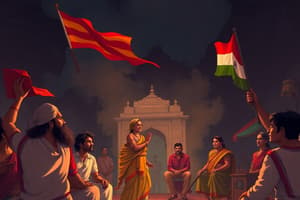Podcast
Questions and Answers
During which period is the origin of the Indian caste system believed to have taken place?
During which period is the origin of the Indian caste system believed to have taken place?
- 500 CE
- 1000 AD
- 1500 BCE (correct)
- 300 BCE
Which of the following classes emerged as a result of the formation of four varnas in the caste system?
Which of the following classes emerged as a result of the formation of four varnas in the caste system?
- Warriors (correct)
- Pilgrims
- Scholars
- Farmers
What was one significant impact of European colonialism on the Indian caste system?
What was one significant impact of European colonialism on the Indian caste system?
- It further formalized the rigid caste categories. (correct)
- It merged all castes into a single category.
- It abolished the caste system completely.
- It allowed complete social mobility among all castes.
Which group sought to establish their authority over other groups based on ritual purity during the emergence of the caste system?
Which group sought to establish their authority over other groups based on ritual purity during the emergence of the caste system?
What are some of the challenges faced by the Indian caste system today as mentioned in the text?
What are some of the challenges faced by the Indian caste system today as mentioned in the text?
What does Gail Omvedt argue about the caste system?
What does Gail Omvedt argue about the caste system?
According to economist Raj Chetty's study, what did children from lower castes experience in terms of socioeconomic mobility?
According to economist Raj Chetty's study, what did children from lower castes experience in terms of socioeconomic mobility?
What are some initiatives aimed at promoting equality and bridging the gap between different castes?
What are some initiatives aimed at promoting equality and bridging the gap between different castes?
Why are affirmative action policies like reservations in government jobs and education controversial?
Why are affirmative action policies like reservations in government jobs and education controversial?
What do scholars aim to achieve by raising awareness about the dynamics of India's caste system?
What do scholars aim to achieve by raising awareness about the dynamics of India's caste system?
Flashcards are hidden until you start studying
Study Notes
Understanding Indian Sociology through the Lens of the Caste System
The caste system has been a defining aspect of Indian society since ancient times, intertwining with various facets of everyday life and influencing numerous fields including economics, politics, religion, education, and social welfare. In this exploration of Indian sociology, we'll delve into how the intricate web of India's caste structure continues to shape our understanding of its people and culture.
A Brief History of the Caste System
This stratified hierarchy is believed to have originated around 1500 BCE during the Vedic period when the Brahmin priests sought to establish their authority over other groups based on ritual purity rather than birth. Over centuries, new castes emerged, leading to the formation of four varnas (classes)—Brahmins (priests), Kshatriyas (warrior class), Vaishyas (merchants), and Shudras (laborers). Social mobility was also possible within each varna; however, it wasn’t until European colonialism that these rigid categories were further formalized by British administrators, who codified them, creating a more fixed order.
Contemporary Perspectives
While the caste system still holds significance today, it faces challenges from modernization, globalization, and changing demographics. Scholars such as Gail Omvedt argue that 'caste is not only part of the past but remains integral to present-day structures,' observing how caste discrimination persists despite reform efforts initiated under the Constitution. Moreover, some researchers suggest ways in which the caste system influences contemporary economic disparities, political representation, and religious practices. For instance, a study conducted by economist Raj Chetty found that children belonging to the lower castes experience less upward socioeconomic mobility compared to those born among higher castes.
Challenging Inequalities
To counteract historical inequalities and promote equality, several measures aimed at bridging the gap between different castes have been implemented. These initiatives have included affirmative action policies like reservations in government jobs and higher education institutions, meant to ensure fairer access to opportunities traditionally denied to members of certain castes. However, while well-intentioned, these programs remain subject to controversy and criticism regarding their effectiveness in achieving equitable outcomes.
Despite ongoing debates surrounding the benefits versus drawbacks of these schemes, the importance of addressing structural inequality cannot be overlooked. By shedding light on the dynamics of India's complex caste system, scholars continue to raise awareness, advocate policies promoting inclusion, and strengthen commitments towards a more equal future for all Indians.
As you can see, exploring the Indian caste system provides us with valuable insights into the interconnectedness of history, culture, current events, and societal change in the country. This context helps us better comprehend sociological realities at play in contemporary India and beyond.
Studying That Suits You
Use AI to generate personalized quizzes and flashcards to suit your learning preferences.




